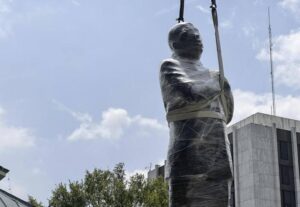In 1761, slave traders captured the girl who was to be named Phillis Wheatley in West Africa and brought her to Boston. John Wheatley, a tailor, and his wife, Susanna, enslaved her. They named her Phillis after the name of the ship that brought her to Boston.
Phillis Wheatley, full name Phillis Wheatley Peters, was the first Black woman to become a notable poet in the United States. She was reportedly born around 1753 in present-day Senegal West Africa and died on December 5, 1784 in Boston, Massachusetts.
Phillis Wheatley was an African American poet who lived during the 18th century. She was the first African American woman to publish a book of poetry, and her life and work continue to inspire and influence generations of writers and scholars.

Born in West Africa in 1753, Wheatley was brought to the British colonies in North America as a slave at the age of seven. She was purchased by a wealthy Boston family, the Wheatleys, who gave her the name Phillis and educated her in literature, history, and theology. Although she was initially taught to read and write so that she could serve as a domestic servant, she showed an early talent for poetry and began writing at a young age.
Wheatley’s first published poem, “On Messrs. Hussey and Coffin,” appeared in a Boston newspaper in 1767 when she was just 14 years old. This was followed by a series of other poems, which were published in various newspapers and magazines in Boston and New York. In 1773, Wheatley’s first book of poetry, “Poems on Various Subjects, Religious and Moral,” was published in London, making her the first African American woman to publish a book of poetry.
Wheatley’s book was an immediate success, and it was praised by many prominent figures of the time, including Benjamin Franklin and George Washington. The book contained 39 poems on a variety of subjects, including religion, morality, and politics. Wheatley’s poetry reflected her deep Christian faith and her belief in the power of education and reason.
Despite her success as a poet, Wheatley faced many challenges in her life. As an enslaved person, she was not free to pursue her own interests or enjoy the fruits of her labor. She was also subjected to racial discrimination and prejudice, both within and outside of the African American community. Many white Americans of the time believed that African Americans were intellectually inferior and incapable of producing literary works of merit, and Wheatley’s success was often attributed to her white sponsors rather than her own talent and hard work.
Despite these obstacles, Wheatley continued to write and publish poetry throughout her life. In 1778, she was manumitted by her owners, the Wheatley family, and she married a free African American man named John Peters. The couple struggled financially and faced many challenges, including the death of two of their children. Wheatley continued to write poetry, but she struggled to find a publisher for her work. She died in poverty in 1784 at the age of 31.
Despite her short life, Wheatley’s legacy as a poet and a trailblazer for African American writers has endured. Her poetry is celebrated for its elegance, its deep Christian faith, and its celebration of the human spirit. Her work has been studied and analyzed by scholars and writers for centuries, and it continues to inspire new generations of poets and thinkers.
One of the most remarkable aspects of Wheatley’s legacy is the fact that she was able to achieve such success as a poet despite the enormous obstacles she faced as an enslaved person and a woman of color. Her poetry was a testament to her intellectual and creative abilities, and it challenged the prevailing beliefs about the inferiority of African Americans and the limitations of women.
Wheatley’s poetry also reflects her deep Christian faith and her belief in the power of education. Many of her poems celebrate the beauty and wonder of nature, and they express a sense of awe and reverence for the divine. Wheatley believed that education was essential for all people, regardless of their race or social status, and she used her own education to challenge the prejudices and stereotypes of her time.
Perhaps most importantly, Wheatley’s legacy is a testament to the resilience and strength of the human spirit. Despite the hardships and injustices she faced, she never lost faith in herself or in the power of her words. Her poetry remains a powerful reminder of the importance of perseverance, courage, and creativity in the face of adversity.
In recent years, Wheatley’s legacy has been celebrated and reassessed by scholars and writers. Many have sought to highlight her contributions to American literature and to recognize the ways in which she paved the way for future generations of African American writers. Her poetry has been anthologized and analyzed, and her life has been the subject of numerous biographies and studies.
At the same time, Wheatley’s legacy continues to inspire new generations of writers and thinkers. Her poetry speaks to the enduring power of the human spirit, and it challenges us to confront the injustices and prejudices of our own time. As we reflect on the legacy of Phillis Wheatley, we are reminded of the importance of courage, perseverance, and creativity in the face of adversity, and we are inspired to continue the work of building a more just and equitable world for all people.
Some Phillis Wheatley poems
Wheatley’s poetry was deeply rooted in her Christian faith, and many of her poems express her reverence for God and her belief in the power of divine grace. In “On Being Brought from Africa to America,” perhaps her most famous poem, she reflects on the experience of being brought from her homeland to America as a slave, and she finds solace in the idea that God has saved her from a life of ignorance and darkness:
‘Twas mercy brought me from my Pagan land,
Taught my benighted soul to understand
That there’s a God, that there’s a Saviour too:
Once I redemption neither sought nor knew.
Some view our sable race with scornful eye,
“Their colour is a diabolic die.”
Remember, Christians, Negros, black as Cain,
May be refin’d, and join th’ angelic train.
This poem, like much of Wheatley’s work, challenges the prevailing attitudes of her time towards African Americans and slavery. She asserts her own humanity and her own worth as a child of God, and she asserts the possibility of redemption and salvation for all people, regardless of their race or social status.
Wheatley’s poetry also reflects her belief in the power of education and reason. In “To the University of Cambridge, in New-England,” she celebrates the achievements of the students and faculty at Cambridge, and she expresses her hope that education will continue to be a force for progress and enlightenment:
While an intrinsic ardor prompts to write,
The muses promise to assist my pen;
‘Twas not long since I left my native shore
The land of errors, and Egyptian gloom:
Father of mercy, ’twas thy gracious hand
Brought me in safety from those dark abodes.
Students, to you ’tis giv’n to scan the heights
Above, to traverse the ethereal space,
And mark the systems of revolving worlds.
Still more, ye sons of science ye receive
The blissful news by messengers from heav’n,
How Jesus’ blood for your redemption flows.
See him with hands out-stretcht upon the cross;
Immense compassion in his bosom glows;
He hears revilers, nor resents their scorn:
What matchless mercy in the Son of God!
Here, Wheatley celebrates the power of education and scientific inquiry, and she links these pursuits to her own faith and her belief in the redemptive power of Christ. She urges the students at Cambridge to use their knowledge and their talents for the greater good, and she expresses her hope that education will continue to be a force for progress and enlightenment in the world.
Despite the many challenges she faced in her life, Phillis Wheatley remains an enduring symbol of courage, resilience, and creativity. Her poetry continues to inspire and challenge us, and her legacy as a trailblazer for African American writers and thinkers reminds us of the ongoing struggle for justice and equality in our world. As we reflect on her life and her work, we are reminded of the importance of education, faith, and perseverance, and we are inspired to continue the work of building a more just and equitable world for all people.




